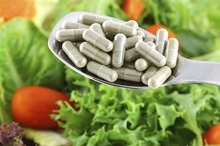How Much Psyllium Should One Take?
As a form of soluble fiber, psyllium is commonly used to treat irregularity or difficult bowel movements, also called constipation. Psyllium is derived from the seeds of a small shrub called Plantago ovata, which is native to India. It's available over-the-counter as psyllium husks and psyllium seeds, alone or together with other supplements in various formulations. If you have questions about how much psyllium you should take, consult your physician for further guidance.
Psyllium Husks
If you're an adult and are using psyllium husks to treat constipation, health professionals with the University of Michigan Health System recommend taking 1 tsp. of this fiber supplement three times daily. Each 1-tsp. dose of psyllium husks should be mixed in a large glass of juice or water and must be consumed immediately. If this mixture is allowed to sit, it thickens and becomes undrinkable.
- If you're an adult and are using psyllium husks to treat constipation, health professionals with the University of Michigan Health System recommend taking 1 tsp.
- dose of psyllium husks should be mixed in a large glass of juice or water and must be consumed immediately.
Psyllium Seeds
Psyllium & Upper Abdominal Pain
Learn More
Adults may take between 1/2 and 2 tsp. of psyllium seed once daily, the University of Maryland Medical Center reports. Initially, you may want to begin with a small half-teaspoon dose of psyllium seeds until your body gets used to this form of fiber. If using psyllium seeds as a treatment for irritable bowel syndrome, you may gradually increase your treatment from a half teaspoon once a day to 1 tsp. four times a day. As with psyllium husks, each dose of psyllium seeds must be mixed with 8 oz. of fluid and immediately consumed.
- Adults may take between 1/2 and 2 tsp.
- Initially, you may want to begin with a small half-teaspoon dose of psyllium seeds until your body gets used to this form of fiber.
Over-the-Counter Psyllium Products
If you're taking an over-the-counter psyllium product, always consult the label to determine how much of this supplement you should take. Over-the-counter psyllium products include powders, wafers, granules, capsules or liquid.
For Children
How Much Fiber in Fibercon Tablets?
Learn More
Always consult your child's pediatrician before giving any type of medication or supplement, including psyllium. In most cases, children between the ages of 6 and 12 may take half the typical adult dosage of psyllium -- but only when recommended by a doctor, the UMMC warns.
Contraindications
Inform your medical provider of any health problems or concerns you may have before taking psyllium supplements. If you have a personal history of kidney disease, consult your doctor before using this form of fiber. People who are allergic to psyllium should not take this supplement. Improper use of psyllium by hypersensitive people may induce a life-threatening allergic reaction. Additionally, avoid taking psyllium if you have any type of narrowing along your digestive tract or have difficulty swallowing. Such health conditions may increase your risk of choking or a bowel obstruction after taking a dose of psyllium.
- Inform your medical provider of any health problems or concerns you may have before taking psyllium supplements.
- Such health conditions may increase your risk of choking or a bowel obstruction after taking a dose of psyllium.
Related Articles
References
- University of Michigan Health System: Psyllium
- University of Maryland Medical Center: Psyllium
- Xiao Z, Chen H, Zhang Y, et al. The effect of psyllium consumption on weight, body mass index, lipid profile, and glucose metabolism in diabetic patients: A systematic review and dose-response meta-analysis of randomized controlled trials. Phytother Res. 2020. doi:10.1002/ptr.6609
- Anderson JW, Allgood LD, Lawrence A, et al. Cholesterol-lowering effects of psyllium intake adjunctive to diet therapy in men and women with hypercholesterolemia: a meta-analysis of 8 controlled trials. Am J Clin Nutr 2000;71:472-479.
- deBock M, Derraik JGB, Brennan CM et al. Psyllium supplementation in adolescents improves fat distribution and lipid profile: a randomized, participant-blinding, placebo-controlled, crossover trial. PLoS One 2012;7:e41735.
- Ribas SA, Cunha DB, Sichieri R et al. Effects of psyllium on LDL cholesterol concentrations in Brazilian children and adolescents: a randomized, parallel clinical trial. Br J Nutr 2015;113:134-141.
- Van Rosendaal GMA, Shaffer EA, Edwards EL, et al. Effect of time of administration on cholesterol-lowering by psyllium: a randomized cross-over study in normocholesterolemic or slightly hypercholesterolemic subjects. Nutr J 2004;3:1-7.
- Wei W, Wang H, Chen XY et al. Time and dose-dependent effect of psyllium on serum lipids in mild to moderate hypercholesterolemia: a meta-analysis of controlled clinical trials. Eur J Clin Nutr 2009;63:821-827.
Writer Bio
Rae Uddin has worked as a freelance writer and editor since 2004. She specializes in scientific journalism and medical and technical writing. Her work has appeared in various online publications. Uddin earned her Master of Science in integrated biomedical sciences with an emphasis in molecular and cellular biochemistry from the University of Kentucky College of Medicine.









